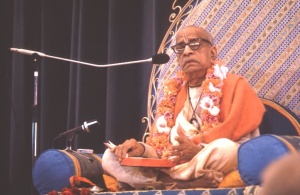CC Madhya 9.269: Difference between revisions
m (1 revision(s)) |
(Vanibot #0054 edit - transform synonyms into clickable links, which search similar occurrences) |
||
| (One intermediate revision by one other user not shown) | |||
| Line 1: | Line 1: | ||
{{ | [[Category:Sri Caitanya-caritamrta - Madhya-lila Chapter 09|C269]] | ||
<div style="float:left">'''[[Sri Caitanya-caritamrta|Śrī Caitanya-caritāmṛta]] - [[CC Madhya|Madhya-līlā]] - [[CC Madhya 9|Chapter 9: Lord Śrī Caitanya Mahāprabhu's Travels to the Holy Places]]'''</div> | |||
<div style="float:right">[[File:Go-previous.png|link=CC Madhya 9.268|Madhya-līlā 9.268]] '''[[CC Madhya 9.268|Madhya-līlā 9.268]] - [[CC Madhya 9.270|Madhya-līlā 9.270]]''' [[File:Go-next.png|link=CC Madhya 9.270|Madhya-līlā 9.270]]</div> | |||
{{CompareVersions|CC|Madhya 9.269|CC 1975|CC 1996}} | |||
{{RandomImage}} | |||
==== TEXT 269 ==== | ==== TEXT 269 ==== | ||
<div | <div class="verse"> | ||
yo dustyajān kṣiti-suta-svajanārtha-dārān | :yo dustyajān kṣiti-suta-svajanārtha-dārān | ||
prārthyāṁ śriyaṁ sura-varaiḥ sadayāvalokām | :prārthyāṁ śriyaṁ sura-varaiḥ sadayāvalokām | ||
naicchan nṛpas tad ucitaṁ mahatāṁ madhu-dviṭ- | :naicchan nṛpas tad ucitaṁ mahatāṁ madhu-dviṭ- | ||
sevānurakta-manasām abhavo ’pi phalguḥ | :sevānurakta-manasām abhavo ’pi phalguḥ | ||
</div> | </div> | ||
| Line 14: | Line 18: | ||
==== SYNONYMS ==== | ==== SYNONYMS ==== | ||
<div | <div class="synonyms"> | ||
''[//vanipedia.org/wiki/Special:VaniSearch?s=yaḥ&tab=syno_o&ds=1 yaḥ]'' — one who; ''[//vanipedia.org/wiki/Special:VaniSearch?s=dustyajān&tab=syno_o&ds=1 dustyajān]'' — very difficult to give up; ''[//vanipedia.org/wiki/Special:VaniSearch?s=kṣiti&tab=syno_o&ds=1 kṣiti]'' — land; ''[//vanipedia.org/wiki/Special:VaniSearch?s=suta&tab=syno_o&ds=1 suta]'' — children; ''[//vanipedia.org/wiki/Special:VaniSearch?s=svajana&tab=syno_o&ds=1 svajana]'' — relatives; ''[//vanipedia.org/wiki/Special:VaniSearch?s=artha&tab=syno_o&ds=1 artha]'' — riches; ''[//vanipedia.org/wiki/Special:VaniSearch?s=dārān&tab=syno_o&ds=1 dārān]'' — and wife; ''[//vanipedia.org/wiki/Special:VaniSearch?s=prārthyām&tab=syno_o&ds=1 prārthyām]'' — desirable; ''[//vanipedia.org/wiki/Special:VaniSearch?s=śriyam&tab=syno_o&ds=1 śriyam]'' — fortune; ''[//vanipedia.org/wiki/Special:VaniSearch?s=sura&tab=syno_o&ds=1 sura]-[//vanipedia.org/wiki/Special:VaniSearch?s=varaiḥ&tab=syno_o&ds=1 varaiḥ]'' — by the best of the demigods; ''[//vanipedia.org/wiki/Special:VaniSearch?s=sa&tab=syno_o&ds=1 sa]-[//vanipedia.org/wiki/Special:VaniSearch?s=dayā&tab=syno_o&ds=1 dayā]'' — merciful; ''[//vanipedia.org/wiki/Special:VaniSearch?s=avalokām&tab=syno_o&ds=1 avalokām]'' — whose glance; ''[//vanipedia.org/wiki/Special:VaniSearch?s=na&tab=syno_o&ds=1 na] [//vanipedia.org/wiki/Special:VaniSearch?s=aicchat&tab=syno_o&ds=1 aicchat]'' — did not desire; ''[//vanipedia.org/wiki/Special:VaniSearch?s=nṛpaḥ&tab=syno_o&ds=1 nṛpaḥ]'' — the King (Mahārāja Bharata); ''[//vanipedia.org/wiki/Special:VaniSearch?s=tat&tab=syno_o&ds=1 tat]'' — that; ''[//vanipedia.org/wiki/Special:VaniSearch?s=ucitam&tab=syno_o&ds=1 ucitam]'' — is befitting; ''[//vanipedia.org/wiki/Special:VaniSearch?s=mahatām&tab=syno_o&ds=1 mahatām]'' — of great personalities; ''[//vanipedia.org/wiki/Special:VaniSearch?s=madhu&tab=syno_o&ds=1 madhu]-[//vanipedia.org/wiki/Special:VaniSearch?s=dviṭ&tab=syno_o&ds=1 dviṭ]'' — of the killer of the demon Madhu; ''[//vanipedia.org/wiki/Special:VaniSearch?s=sevā&tab=syno_o&ds=1 sevā]-[//vanipedia.org/wiki/Special:VaniSearch?s=anurakta&tab=syno_o&ds=1 anurakta]'' — engaged in the service; ''[//vanipedia.org/wiki/Special:VaniSearch?s=manasām&tab=syno_o&ds=1 manasām]'' — the minds of whom; ''[//vanipedia.org/wiki/Special:VaniSearch?s=abhavaḥ&tab=syno_o&ds=1 abhavaḥ]'' — cessation of the repetition of birth and death; ''[//vanipedia.org/wiki/Special:VaniSearch?s=api&tab=syno_o&ds=1 api]'' — even; ''[//vanipedia.org/wiki/Special:VaniSearch?s=phalguḥ&tab=syno_o&ds=1 phalguḥ]'' — insignificant. | |||
</div> | </div> | ||
| Line 21: | Line 25: | ||
==== TRANSLATION ==== | ==== TRANSLATION ==== | ||
<div | <div class="translation"> | ||
“‘It is very difficult to give up material opulence, land, children, society, friends, riches, wife or the blessings of the goddess of fortune, which are desired even by great demigods. But King Bharata did not desire such things, and this was quite befitting his position, because for a pure devotee whose mind is always engaged in the service of the Lord, even liberation, or merging into the existence of the Lord, is insignificant. And what to speak of material opportunities?’ | “‘It is very difficult to give up material opulence, land, children, society, friends, riches, wife or the blessings of the goddess of fortune, which are desired even by great demigods. But King Bharata did not desire such things, and this was quite befitting his position, because for a pure devotee whose mind is always engaged in the service of the Lord, even liberation, or merging into the existence of the Lord, is insignificant. And what to speak of material opportunities?’ | ||
</div> | </div> | ||
| Line 28: | Line 32: | ||
==== PURPORT ==== | ==== PURPORT ==== | ||
<div | <div class="purport"> | ||
This is a verse from Śrīmad-Bhāgavatam ([[SB 5.14.44]]) concerning the glorification of King Bharata, whom Śukadeva Gosvāmī was describing to King Parīkṣit. | This is a verse from [[Srimad-Bhagavatam|''Śrīmad-Bhāgavatam'']] ([[SB 5.14.44]]) concerning the glorification of King Bharata, whom Śukadeva Gosvāmī was describing to King Parīkṣit. | ||
</div> | </div> | ||
__NOTOC__ | |||
<div style="float:right; clear:both;">[[File:Go-previous.png|link=CC Madhya 9.268|Madhya-līlā 9.268]] '''[[CC Madhya 9.268|Madhya-līlā 9.268]] - [[CC Madhya 9.270|Madhya-līlā 9.270]]''' [[File:Go-next.png|link=CC Madhya 9.270|Madhya-līlā 9.270]]</div> | |||
__NOTOC__ | |||
__NOEDITSECTION__ | |||
Latest revision as of 00:06, 20 February 2024

A.C. Bhaktivedanta Swami Prabhupada
TEXT 269
- yo dustyajān kṣiti-suta-svajanārtha-dārān
- prārthyāṁ śriyaṁ sura-varaiḥ sadayāvalokām
- naicchan nṛpas tad ucitaṁ mahatāṁ madhu-dviṭ-
- sevānurakta-manasām abhavo ’pi phalguḥ
SYNONYMS
yaḥ — one who; dustyajān — very difficult to give up; kṣiti — land; suta — children; svajana — relatives; artha — riches; dārān — and wife; prārthyām — desirable; śriyam — fortune; sura-varaiḥ — by the best of the demigods; sa-dayā — merciful; avalokām — whose glance; na aicchat — did not desire; nṛpaḥ — the King (Mahārāja Bharata); tat — that; ucitam — is befitting; mahatām — of great personalities; madhu-dviṭ — of the killer of the demon Madhu; sevā-anurakta — engaged in the service; manasām — the minds of whom; abhavaḥ — cessation of the repetition of birth and death; api — even; phalguḥ — insignificant.
TRANSLATION
“‘It is very difficult to give up material opulence, land, children, society, friends, riches, wife or the blessings of the goddess of fortune, which are desired even by great demigods. But King Bharata did not desire such things, and this was quite befitting his position, because for a pure devotee whose mind is always engaged in the service of the Lord, even liberation, or merging into the existence of the Lord, is insignificant. And what to speak of material opportunities?’
PURPORT
This is a verse from Śrīmad-Bhāgavatam (SB 5.14.44) concerning the glorification of King Bharata, whom Śukadeva Gosvāmī was describing to King Parīkṣit.